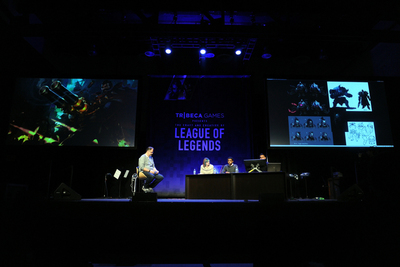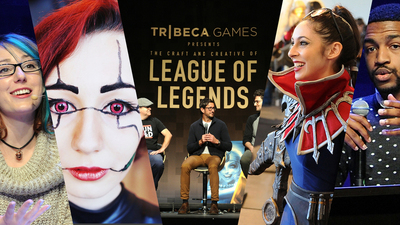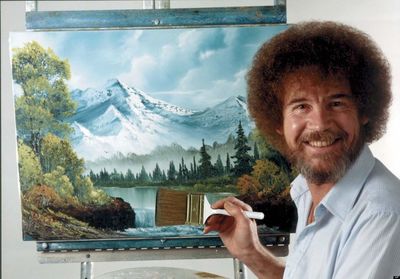
BY THE EDITORS |
Two Riot Games Documentaries Shed Light on LEAGUE OF LEGENDS’ Surging Fanbase
Get to know Riot Games' wide-ranging player community via two enjoyable documentaries.

I should admit that I didn’t exactly understand League of Legends. I’m still not sure I entirely do. I am, in all honesty, one of those people who couldn’t name more than ten video games if he tried.
Needless to say, when I first watched the short, League-focused documentaries Live / Play and Love & League, I wasn’t sure what to expect. Produced by the documentary team at Riot Games, each film focuses on several players within Riot’s expansive network of players, a group I assumed I had little in common with. But, then, I was surprised.
These touchingly-made and gorgeously-shot documentaries may not compel you to wage online battle across Summoner’s Rift, but they do provide an interesting window into a vast community of players, who are as passionate about their game as so many of us are about our movies, music, or whatever. You may not know the game, but you’ll enjoy getting to know the players, each of whom are worthy of your attention and, furthermore, your respect.
In Live / Play, we follow five players from across the globe, observing the diverse ways in which League of Legends fits into their everyday lives. In Cairo, a young man named Amin travels to the city’s nearest internet café to play the game as a respite from the daily struggles of Egypt’s national crisis. Meanwhile, in Stykkishólmur, Iceland, another young man named Eyjo plays League on a boat while balancing his job as a fisherman in order to save money for university.

Love & League utilizes a similar filmmaking approach but instead sets its focus on four North American gamer couples, digging further into the day-to-day realities of relationships that are often built and bonded by League. We watch as a deaf woman uses the game as a communication bridge with her League-enthusiast boyfriend, while another couple takes as much active pleasure in gaming as they do in their day jobs — as husband-and-wife bounty hunters.
All of the involved filmmakers spend intimate and engaged time with their subjects, plumbing their experiences to discover their real-world struggles, disappointments, and triumphs, using the game as bond that fuses these players together across countries, continents, and other innumerable international barriers through their shared love of League.
I talked to Riot producers Alexa Darrin and Ashley Rios-Vazquez about the globe-spanning productions behind each film, finding the right players, and the potential that suddenly lies within Riot’s emerging entertainment future.

Tribeca: What are you working on right now?
Ashley Rios-Vasquez: I just got back from Hong Kong and Thailand, where we were filming a documentary about a Muay Thai boxer who has played three thousand games as Darius in League of Legends. It’s his favorite champion and the only champion he plays. We were in Hong Kong to film his championship-boxing match and then we followed him to Thailand to meet and film his family and see where Muay Thai got started for him. We got an incredible interview from him and some great, stylized b-roll of him training in the gym where he grew up too.
Tribeca: What inspired Riot to pursue documentary filmmaking?
Alexa Darrin: As far as documentary filmmaking for the North America region in particular, it started as a way to put a focus on the positive things happening in the community. If you look at the news, negative stories seem to get more attention than positive stories and are often more memorable. This was happening in the League community, where the cool people and things happening in the community were getting buried by the few negative stories. We saw an opportunity to highlight the positive stories. Our community is so amazing and passionate and creative and surprising, we wanted to find more ways to share individual stories with the wider community.
How did you find these players/couples? What was the process like of actually locating them and getting them to agree to be on camera?
AD: For Love & League, I found three of the couples on League of Legends Boards. I shared my own story, about how my boyfriend at the time taught me League and we played together all the time. The discussion blew up! So that was confirmation that this was a topic that resonated with players. Three of the four couples we ended up using for Love & League came from that Boards discussion, actually!
ARV:Trying to find the right cast in a sea of more than 67 million players is not an easy feat. My background at Riot Games started in recruiting so I kind of approached it the way I would recruit talent--through referral. We figured the local Riot offices are going to know the players in their territories best. Along with Public Record, we reached out to all of our regional offices (Turkey, Brazil, Russia, Korea, Southeast Asia, and more) and explained the project to them, sharing with them different archetypes we were looking for and giving examples of stories we might find interesting. Most of these regions are hungry to tell stories about their players so once we got their buy-in, they started sending us some really cool stories.
Jessica Sherry, the producer on the Public Record side, would do an initial screen with them and if it went well, the directors, Nathan Caswell and Jeremiah Zagar would do a follow-up with them and then make recommendations to us based on the players they spoke with. Public Record also worked with our local offices to post casting calls in our forums and worked with a few local casting directors. Most of the people we casted in Live/Play came through referral from our local teams though. Korea is a good example: the community team sent us a YouTube video of a robotic Kog’Maw (which is a champion in our game) that was made by one of their players who was a little older than our core gamer audience. He was super excited to be part of the project.
WATCH: LIVE/PLAY
Have you kept in contact with any of your subjects?
ARV: After the documentary released I reached out to a few of them. An initial concern early on was how the community would treat the players featured. There are always going to be trolls out there, so we spoke with each of the cast members and asked them if they had any concerns but all of them were not too worried about it. And for the most part, the community was very supportive of the players featured. I know Mariana had a lot of people reach out to her to hire her to make costumes, and Amin had people from all over the world who wanted to connect with him in game because they related to the revolution he had just been through or were having similar issues finding jobs straight out of college.
In Eyjo’s case, the documentary was released during heightened public sensitivity around hunting. He had a few people make comments about how he was hunting foxes in the documentary. He handled it very gracefully, explaining that they only hunt foxes if they absolutely have to (it’s not for sport) and they do it because these foxes eat the ducks on their island that supply these feathers called Eider Down which is how they make living. Aside from that, the community was super supportive and he was excited to meet people from all over the world and connect with them in game.
WATCH: LOVE &LEAGUE
These documentaries will obviously appeal to League fans, but I think they’re diverse, universal, and beautifully-made enough to reach those beyond the League fanbase. What do you hope an audience who doesn’t play League takes away from these films?
AD: This is a really tough issue because we had to really make sure that these documentaries were for our players first and foremost. That means that some of the material goes over the heads of the audience outside the League community because of all the League lingo and references. But it has always been my hope that there would be spillover, that someone who doesn’t play League or video games would see these docs and say, “Wow, I had no idea gamers were so… cool.” Many people have this misconception that gamers are people who play alone in their basement. It has this negative connotation for some, like, why don’t you go outside and interact with people? So I guess the main takeaway I’d want people to have is to see how video games are something that brings people together in a really positive and meaningful way.
ARV: With all of our documentaries, our audience is going to be players first. When we started to work with outside filmmakers, they understood that players were our target audience, but they’re going to naturally want it to appeal to people beyond the League community as well.
There is a part in Live/Play where the five players actually explain in simple terms what League of Legends is and when we initially screened the rough cut with stakeholders, they suggested we cut the explanations. After all, League of Legends players already know the game, so why explain it to them? We want to avoid speaking down to our audience, but the same time, we also felt like this was a documentary that players who love League could share with their families, friends, teachers, or anyone who might not understand why they spend their time playing this game.
Nathan and Jeremiah asked if they could smooth the section out to make it fit better, and if we didn’t like it after a second pass then they would remove it. In the end, Nathan and Jeremiah did a great job of cutting it in a way that didn’t feel like it alienated players but also provided a simple way to explain League to whoever they chose to share it with outside of the community. So, I hoped people outside of the League community would watch it and empathize with the players featured in the doc or have a better understanding about this community they were a part of as opposed to looking at the community and judging them. We also hoped to convey the truly global nature of this community and I think we achieved both of those goals based on player sentiment.
LEARN MORE ABOUT RIOT'S FILMMAKING
Tribeca Games invited Riot Games to showcase the creative process behind League of Legends at a special event in New York on November 13. Panels include Rioters discussing Riot Films.

